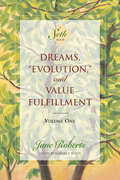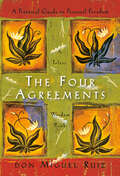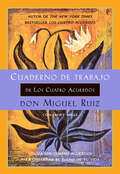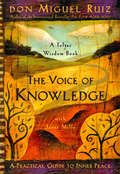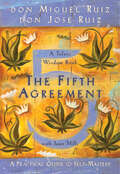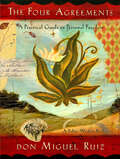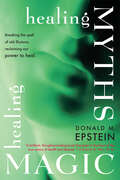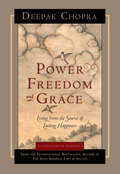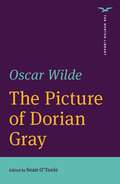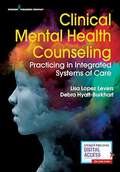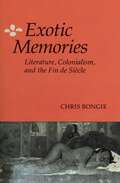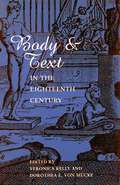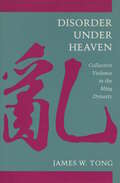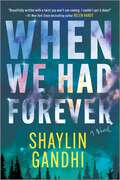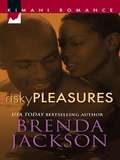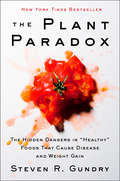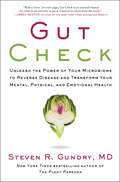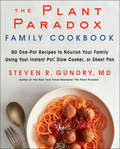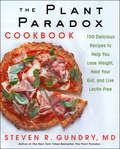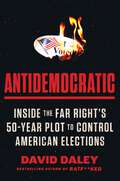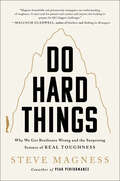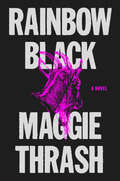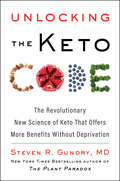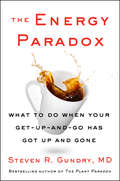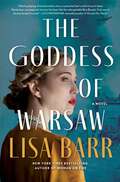- Table View
- List View
Dreams, Evolution, and Value Fulfillment, Vol 1 (A Seth Book)
by Jane RobertsFrom the Bestselling Author of Seth Speaks and The Nature of Personal RealityIn this first volume of Dreams, &“Evolution,&” and Value Fulfillment, Seth takes us on an odyssey to identify the origins of our universe and our species. He asserts that &“consciousness units&” form the basis of all energy and matter, and charts a conscious, self-aware universe that is constantly recreated by our own thoughts, dreams, and desires. Illuminating the part that humans play in the greater scheme of things, he suggests that we are alive not only for the continuation of the species but to add to the very quality of life itself.Other fascinating topics include:· The role dreams play in the creation of language and technology· The relationship between genetic heritage and reincarnation· How creativity proviudes a link with the source of all existence· The true power of the imagination, and the importance of broadening its scope· A discussion of &“value fulfillment&” — or the yearning to enhance the quality of life — as a fundamental desire in all life formsStimulating and provocative, this long-awaited book answers crucial questions about the entire significance of Seth's system of thought.&“When I speak of the dream world, I am not referring to some imaginary realm, but to the kind of world of ideas, of thoughts, of mental actions, out of which all form as you think of it emerges. In actuality, this is an inner universe rather than an inner world. Your physical reality is but one materialization of that inner organization.&” — Jane Roberts, Speaking for Seth
The Four Agreements: A Practical Guide to Personal Freedom (A Toltec Wisdom Book)
by Don Miguel Ruiz Janet MillsIn The Four Agreements, bestselling author don Miguel Ruiz reveals the source of self-limiting beliefs that rob us of joy and create needless suffering. Based on ancient Toltec wisdom, The Four Agreements offer a powerful code of conduct that can rapidly transform our lives to a new experience of freedom, true happiness, and love.• A New York Times bestseller for over a decade • An international bestseller published in 53 languages worldwide &“This book by don Miguel Ruiz, simple yet so powerful, has made a tremendous difference in how I think and act in every encounter.&” — Oprah Winfrey &“Don Miguel Ruiz&’s book is a roadmap to enlightenment and freedom.&” — Deepak Chopra, Author, The Seven Spiritual Laws of Success&“An inspiring book with many great lessons.&” — Wayne Dyer, Author, Real Magic&“In the tradition of Castaneda, Ruiz distills essential Toltec wisdom, expressing with clarity and impeccability what it means for men and women to live as peaceful warriors in the modern world.&” — Dan Millman, Author, Way of the Peaceful Warrior
Cuaderno de trabajo de Los cuatro acuerdos: Utiliza Los cuatro acuerdos para gobernar el sueño de tu vida (Un libro de la sabiduría tolteca)
by Don Miguel Ruiz Janet MillsLos cuatro acuerdos presentaban un sencillo pero poderoso código de conducta para alcanzar la libertad personal y la verdadera felicidad. Ahora, el Cuaderno de trabajo de Los cuatro acuerdos nos lleva aún más lejos en el viaje para recobrar la conciencia y la sabiduría de nuestro auténtico yo. Este Cuaderno de trabajo es de lectura obligatoria para todas aquellas personas que disfrutaron el primer libro de don Miguel Ruiz y para cualquiera que esté dispuesta a dejar atrás el sufrimiento y a dominar el arte de vivir en nuestro estado natural: la felicidad. En este libro encontrarás:• Cómo romper la domesticación que te mantiene esclavizado a causa del miedo• Las claves para recuperar tu voluntad, tu fe y el poder de tus palabras• Ideas prácticas que te ayudarán a convertirte en el maestro de tu propia vida• Un diálogo con el autor sobre cómo vivir según la filosofía de los cuatro acuerdosLos cuatro acuerdos son una herramienta para la transformación que te ayuda a dejar de juzgar, principalmente a ti mismo, y a empezar a practicar otra forma de vida. — de la Introducción
The Voice of Knowledge: A Practical Guide to Inner Peace (A Toltec Wisdom Book)
by Don Miguel Ruiz Janet MillsFrom the bestselling author of The Four AgreementsIn The Voice of Knowledge, Miguel Ruiz reminds us of a profound and simple truth: The only way to end our emotional suffering and restore our joy in living is to stop believing in lies — mainly about ourselves. Based on ancient Toltec wisdom, this breakthrough book shows us how to recover our faith in the truth and return to our own common sense. Ruiz changes the way we perceive ourselves, and the way we perceive other people. Then he opens the door to a reality that we once perceived when we were one and two years old — a reality of truth, love, and joy."We are born in truth, but we grow up believing in lies. . . . One of the biggest lies in the story of humanity is the lie of our imperfection." — don Miguel Ruiz
The Fifth Agreement: A Practical Guide to Self-Mastery (A Toltec Wisdom Book)
by Don Miguel Ruiz Don Jose Ruiz Janet MillsIn The Four Agreements, don Miguel Ruiz revealed how the process of our education, or "domestication," can make us forget the wisdom we were born with. Throughout our lives, we make many agreements that go against ourselves and create needless suffering. The Four Agreements help us to break these self-limiting agreements and replace them with agreements that bring us personal freedom, happiness, and love. In The Fifth Agreement, don Miguel Ruiz joins his son, don Jose Ruiz, to offer a fresh perspective on The Four Agreements, and a powerful new agreement for transforming our lives into our personal heaven. The Fifth Agreement takes us to a deeper level of awareness of the power of the Self, and returns us to the authenticity we were born with. In this compelling sequel to the book that has changed the lives of millions of people around the world, we are reminded of the greatest gift we can give ourselves: the freedom to be who we really are.
The Four Agreements: A Practical Guide to Personal Freedom (Four-color Illustrated Ed.) (A Toltec Wisdom Book)
by Don Miguel Ruiz Janet MillsThis four-color illustrated edition of The Four Agreements celebrates a personal growth classic. With more than a decade on The New York Times bestseller list and over 15 million copies in print, The Four Agreements continues to top the bestseller lists. In The Four Agreements don Miguel Ruiz reveals the source of self-limiting beliefs that rob us of joy and create needless suffering. Based on ancient Toltec wisdom, the Four Agreements offer a powerful code of conduct that can rapidly transform our lives to a new experience of freedom, true happiness, and love.
Healing Myths, Healing Magic: Breaking the Spell of Old Illusions; Reclaiming Our Power to Heal
by Donald M. EpsteinIn this breakthrough book, Epstein examines the deeply ingrained stories, or myths, we commonly hold about how our bodies heal — myths that can actually inhibit healing. For example: “I must forgive in order to heal,” “A person may be too far gone to heal,” or “Healing is not always available.” Epstein exposes each myth individually, then he suggests an alternative statement, or “healing magic,” to help us reclaim our body’s natural ability to heal.
Power Freedom and Grace: Living from the Source of Lasting Happiness
by Deepak Chopra MD&“This book captures the essence of all of my talks over the last 20 years. It is the distillation of almost everything I have taught up to now.&” — Deepak ChopraDeepak Chopra considers the mystery of our existence and its significance in our eternal quest for happiness. Who am I? Where did I come from? Where do I go when I die? Chopra draws upon the ancient philosophy of Vedanta and the findings of modern science to help us understand and experience our true nature, which is a field of pure consciousness.When we understand our true nature, we begin to live from the source of true happiness, which is not mere happiness for this or that reason, but true inner joy. When we know who we are, we allow the universe to flow through us with effortless ease, and our lives are infused with power, freedom, and grace.
The Picture of Dorian Gray (The Norton Library)
by Oscar WildePart of the Norton Library series The Norton Library edition of The Picture of Dorian Gray features the complete text of the revised and expanded version of the novel, published in 1891. In his insightful introduction, Sean O’Toole sheds new light on the novel’s philosophical and stylistic achievements and on the cultural milieu that shaped Wilde’s groundbreaking exploration of beauty, desire, and the dangers of influence. The Norton Library is a growing collection of high-quality texts and translations—influential works of literature and philosophy—introduced and edited by leading scholars. Norton Library editions prepare readers for their first encounter with the works that they’ll re-read over a lifetime. Inviting introductions highlight the work’s significance and influence, providing the historical and literary context students need to dive in with confidence. Endnotes and an easy-to-read design deliver an uninterrupted reading experience, encouraging students to read the text first and refer to endnotes for more information as needed. An affordable price (most editions are $10 or less) encourages students to buy the book and to come to class with the assigned edition. This purchase offers access to the digital ebook only.
Clinical Mental Health Counseling: Practicing in Integrated Systems of Care
by Lisa Lopez Levers Debra Hyatt-BurkhartThis introductory textbook, written specifically for graduate students in clinical mental health counseling programs, is distinguished by a unique integrated system-of-care approach, reflecting current trends in mental health treatment. Designed to address the 2016 CACREP standards, the book delivers an in-depth examination of the professional knowledge, skills, and current issues in professional counseling that are essential to clinical practice. The textbook emphasizes the elements of practice, while providing students with ample case studies that enable them to integrate theoretical concepts with real-world examples. By distilling a wealth of knowledge from experts in the field, the textbook looks at the history and contemporary issues of mental health counseling through the lens of a bioecological approach. Engaging chapters focus on issues critical to mental health counseling, including strength-based approaches, varied clinical practice settings, professional issues, self-care, and more. Additionally, the text presents dilemmas and pitfalls intrinsic to mental health practice. Learning objectives, case illustrations, and abundant resources in each chapter reinforce the practical, real-world information upon which students can build throughout their education. A robust Instructor’s Manual and key PowerPoint slides also are provided. Purchase includes access to the e-book for use on most mobile devices or computers. Key Features: Offers unique, integrated system-of-care and community-based approaches integral to current trends Provides emphases on strength-based and ecological perspectives of CMHC practice Includes real-life examples and insights that facilitate the integration of theory and practice Describes dilemmas and pitfalls intrinsic to a variety of mental health practice topics Includes tips from the field and real-world case illustrations to enhance clinical application Includes learning objectives in each chapter Reflects 2016 and 2009 CACREP standards that are highlighted in each chapter
Exotic Memories: Literature, Colonialism, and the Fin de Siècle
by Chris BongieThis book focuses on the literature of exoticism at the turn of the last century and how it foreshadows our own fin de siècle. Earlier writers of exoticism had turned away from the West and its modernity, rejecting the social changes caused by industrialization and displacing onto 'savage' or 'primitive' cultures their aspirations for political freedom. By the turn of the century, however, European nations had reduced vast areas of the globe to colonial status: this global exportation of Western cultural norms and economic systems had a critical effect on the literature of exoticism. In concentrating on writers from the age of the New Imperialism (1880-1920), this book reveals an important contradiction at the heart of the exoticist impulse: the very expansion that enabled European writers to go in search of exotic Others ensured the eventual disappearance of the exotic. Turn-of-the-century writers of exoticism thus give voice to a deep nostalgia both for the values supposedly lost to the West in its process of modernization and for those once exotic places in which they found, with increasing disappointment, not pristine innocence but merely the traces of their own culture. The author concentrates on four writers - Jules Verne, Pierre Loti, Victor Segalen, and Joseph Conrad - although he touches on a number of other writers, and even painters, like Paul Gauguin. The works of these four writers foreground attitudes and assumptions useful for understanding a wide array of phenomena: an examination of these works shows how nostalgia for a cultural Other was built into the intellectual configuration of modernism, throws light on the early history of anthropology, and helps us understand features of our own cultural formation that are becoming increasingly important in today's global village. Making an explicit link between turn-of-the-century exoticism and the present day, the book concludes with a critical assessment of Pier Paolo Pasolini's neo-exoticist attachment to a supposedly revolutionary Third World in his poetry and literary criticism. The book's critical stance is noteworthy, drawing its basic assumptions from pensiero debole, the 'weak thought' of the contemporary Italian philosopher Gianni Vattimo, whose poststructuralist theories are only now becoming known in the United States. 'Weak thought' seeks to supersede outmoded, metaphysical categories of thought, not by replacing them with something new, but by an elegaic, recollective, and rhetorical dwelling within those categories. The author also makes creative use of narrative theory, and draws on the recent 'new historicism', reading literary texts to excellent effect against the historical events that made them possible.
Body and Text in the Eighteenth Century
by Veronica KellyTwelve scholars from the fields of English, French, and German literature here examine the complex ways in which the human body becomes the privileged semiotic model through which eighteenth-century culture defines its political and conceptual centers. In making clear that the deployment of the body varies tremendously depending on what is meant by the 'human body', the essays draw on popular literature, poetics and aesthetics, garden architecture, physiognomy, beauty manuals, pornography and philosophy, as well as on canonical works in the genres of the novel and the drama.
Disorder Under Heaven: Collective Violence in the Ming Dynasty
by James W. TongA monumental study of collective violence in the premodern world, this book analyzes all instances of rebellion and banditry recorded in 1,097 countries in China during the 277 years of the Ming dynasty (1368-1644). The assembled evidence constitutes the largest annual, county-level time-series on collective violence events in any part of the world, and the 630 recorded cases are used to test the major social science theories on the origins of collective violence. Using systematic data collected from local gazetteers on natural calamities, size of harvests, famine relief, physical terrain, local construction, and troop deployment, the author advances and validates a rational-choice argument that violence increased when survival in a subsistence economy became uncertain and the likelihood of punishment was low. Analyzing the administrative effectiveness and coercive capacity of the Ming state, the author also finds evidence to support a complementary structuralist explanation for increased collective violence in times of lax rulers, state insolvency, and inadequate welfare and tax policies. After an introductory chapter, the author explicates the main theoretical and methodological issues of collective violence and sketches the empirical pattern of rebellions and banditry, differentiating them by the level of threat they posed to the regime and by the sociopolitical profile of participating groups. In the next four chapters, he relates the Ming empirical configuration to four theoretical frameworks for collective violence: rational choice,which includes the issue of motive and choice—why people chose to become bandits; opportunity, in which the level of Ming collective violence is treated to variations in a regime's coercive capacity; social change, which is used to shed light on food riots, anti-tax rebellions, and conflict between employers and employees and between natives and outsiders; and class conflict, which prompts the author to assess the Marxist explanation for collective violence by investigating revolts of commoners against imperial clansmen, bondservants against masters, and tenants against landlords. The final chapter presents how the author's conclusions on why and how people became outlaws in the Ming and points the questions for future research.
When We Had Forever: A Novel
by Shaylin Gandhi&“Captivating and emotionally charged with a storyline you won&’t see coming. All the stars in the sky.&” —MIA SHERIDAN, New York Times bestselling authorAn emotionally powerful roller coaster of a novel about losing and finding love, perfect for fans of Colleen Hoover and Lucy Score.Six months after her husband died in a car crash, Mina Drake is still mired in a haze of grief. Reminders of her years with Michael are everywhere, but beneath her heartache lies an even more painful emotion. It&’s a guilty suspicion she can hardly admit to anyone, even herself—that her marriage was over long before Michael&’s accident.They were good together once, she&’s sure of it, sharing a connection so deep that Mina can&’t understand how it unraveled. That is, until a chance discovery in her husband&’s office—and the reappearance of Michael&’s estranged brother, Grayson, a notorious bad-boy photographer—awakens her to possible answers.More shocking still is the pull Mina feels to tattooed, scarred Grayson, who&’s nothing at all like the man she married. But as feelings stir to life again, so do secrets, changing everything she thought she knew about her marriage, and about the risks and rewards of loving with no limits…Perfect for fans of: Enemies-to-lovers Second Chance Romance Slow Burns Forbidden Love Lucy Score, Emily Henry and Mia Sheridan
Risky Pleasures (Forged of Steele)
by Brenda JacksonAlthough frustrated in his attempt to acquire SteeleCorporation, arrogant millionaire Cameron Cody will notbe denied the firm's most attractive asset, Vanessa Steele.So when Cameron learns that Vanessa is house-sitting forher sister in Jamaica, he buys the adjoining property andmakes her an offer she can't refuse....Cameron is determined to prove to Vanessa that he isthe one temptation she cannot resist, but she is equallydetermined to prove him wrong. What Vanessa doesn'tsuspect is that Cameron intends to brand her so deeplywith his island passion, that once they're back in theStates, she'll be the one in hot pursuit.
The Plant Paradox: The Hidden Dangers in "Healthy" Foods That Cause Disease and Weight Gain (The Plant Paradox #1)
by Dr. Steven R Gundry, MDFrom renowned cardiac surgeon Steven R. Gundry, MD, the New York Times bestselling The Plant Paradox is a revolutionary look at the hidden compounds in "healthy" foods like fruit, vegetables, and whole grains that are causing us to gain weight and develop chronic disease.Most of us have heard of gluten—a protein found in wheat that causes widespread inflammation in the body. Americans spend billions of dollars on gluten-free diets in an effort to protect their health. But what if we’ve been missing the root of the problem? In The Plant Paradox, renowned cardiologist Dr. Steven Gundry reveals that gluten is just one variety of a common, and highly toxic, plant-based protein called lectin. Lectins are found not only in grains like wheat but also in the “gluten-free” foods most of us commonly regard as healthy, including many fruits, vegetables, nuts, beans, and conventional dairy products. These proteins, which are found in the seeds, grains, skins, rinds, and leaves of plants, are designed by nature to protect them from predators (including humans). Once ingested, they incite a kind of chemical warfare in our bodies, causing inflammatory reactions that can lead to weight gain and serious health conditions.At his waitlist-only clinics in California, Dr. Gundry has successfully treated tens of thousands of patients suffering from autoimmune disorders, diabetes, leaky gut syndrome, heart disease, and neurodegenerative diseases with a protocol that detoxes the cells, repairs the gut, and nourishes the body. Now, in The Plant Paradox, he shares this clinically proven program with readers around the world.The simple (and daunting) fact is, lectins are everywhere. Thankfully, Dr. Gundry offers simple hacks we easily can employ to avoid them, including:Peel your veggies. Most of the lectins are contained in the skin and seeds of plants; simply peeling and de-seeding vegetables (like tomatoes and peppers) reduces their lectin content.Shop for fruit in season. Fruit contain fewer lectins when ripe, so eating apples, berries, and other lectin-containing fruits at the peak of ripeness helps minimize your lectin consumption.Swap your brown rice for white. Whole grains and seeds with hard outer coatings are designed by nature to cause digestive distress—and are full of lectins.With a full list of lectin-containing foods and simple substitutes for each, a step-by-step detox and eating plan, and delicious lectin-free recipes, The Plant Paradox illuminates the hidden dangers lurking in your salad bowl—and shows you how to eat whole foods in a whole new way.
Gut Check: Unleash the Power of Your Microbiome to Reverse Disease and Transform Your Mental, Physical, and Emotional Health (The Plant Paradox #7)
by Dr. Steven R Gundry, MDIn this groundbreaking addition to his New York Times bestselling Plant Paradox series, Steven R.Gundry, MD offers a definitive guide to the gut biome and its control over its home—us!—revealing the unimaginably complex and intelligent ecosystem controlling our health and teaching us how to heal our guts to prevent and reverse every type of disease. We may believe that we are the masters of our fates, but in reality, we are at the mercy of hundreds of trillions of single-celled organisms that exert control over every aspect of how our minds and bodies function. These are the diverse species of microbes living in our guts, mouths, and skin that work together synergistically to communicate with each other and with every system in our bodies. You are your microbiome’s home, and it wants to take care of you, but first you have to protect it.In Gut Check, Dr. Steven Gundry reveals the emerging science proving that Hippocrates was right – all disease begins in the gut. When our microbiomes are out of balance, it affects our immune systems, our hormone levels, our mental health, our longevity, and our risk of developing autoimmunity, heart, and neurodegenerative disease, as well as arthritis, diabetes, and cancer. Yet, not all hope is lost: disease can also be healed in the gut if we choose to treat our microbes right. In Gut Check, Dr. Gundry shows us how. In his warm, authoritative voice, Dr. Gundry provides us with the keys to unlocking our gut health, allowing our bodies, and its microbiome, to function at their highest potential. Sharing shocking new research as well as a detailed eating plan with food lists and recipes to heal and rebalance the microbiome, Gut Check provides the cutting-edge information and tools we need to repair our health and reclaim our lives.
The Plant Paradox Family Cookbook: 80 One-Pot Recipes to Nourish Your Family Using Your Instant Pot, Slow Cooker, or Sheet Pan (The Plant Paradox #5)
by Dr. Steven R Gundry, MDFrom the New York Times bestselling author of The Plant Paradox comes a guide to one-pot cooking for the whole family, with a special focus how to make the Plant Paradox program kid-friendly.Since the publication of The Plant Paradox in 2017, hundreds of thousands of people have embraced Dr. Gundry’s nutritional protocol—and experienced life-changing results. But most of Dr. Gundry’s readers aren’t cooking for themselves alone. “How can I extend this way of eating to my entire family? And is it safe for my kids?” are the questions he is most often asked.In The Plant Paradox Family Cookbook, Dr. Gundry reassures parents as he sets the record straight, providing an overview of children’s nutritional needs and explaining how we can help our kids thrive on the Plant Paradox program—a diet low in lectins. Dr. Gundry offers shocking evidence of how the Plant Paradox program is not only “safe” for kids, but also the best possible way to set them up for a lifetime of health and responsible eating. As research continues to bear out, a healthy microbiome—or “gut”—is the cornerstone of human health. The foods we eat at the beginning of our lives have a long-term impact on the makeup of our microbiome. Lectin-containing foods—such as grains, legumes, certain fruits and vegetables, and conventional dairy—damage it by creating holes in the gut wall and triggering the kind of systemic inflammation that lays the groundwork for disease. And yet, many of the foods we are routinely told to feed our children—think milk, whole grain bread, peanut butter—have an incredibly high lectin content.The Plant Paradox Family Cookbook includes more than 80 recipes that make cooking for a family a breeze. And since pressure cooking is the best and easiest way to reduce lectin content in foods like grains and beans, the majority of the quick and easy recipes are Instant-Pot friendly. From weeknight dinners to make-ahead breakfasts to snacks and even lunchbox-ready meals, The Plant Paradox Family Cookbook will help the whole family experience the incredible benefits of the Plant Paradox program.
The Plant Paradox Cookbook: 100 Delicious Recipes to Help You Lose Weight, Heal Your Gut, and Live Lectin-Free (The Plant Paradox #2)
by Dr. Steven R Gundry, MDFrom renowned cardiac surgeon and acclaimed author Dr. Steven R. Gundry, the companion cookbook to New York Times bestselling The Plant Paradox, offering 100 easy-to-follow recipes and four-color photos. In the New York Times bestseller The Plant Paradox, Dr. Steven Gundry introduced readers to the hidden toxins lurking in seemingly healthy foods like tomatoes, zucchini, quinoa, and brown rice: a class of plant-based proteins called lectins. Many people are familiar with one of the most predominant lectins—a substance called gluten, which is found in wheat and other grains. But while cutting out the bread and going gluten-free is relatively straightforward, going lectin-free is no small task.Now, in The Plant Paradox Cookbook, Dr. Gundry breaks down lectin-free eating step by step and shares one hundred of his favorite healthy recipes. Dr. Gundry will offer an overview of his Plant Paradox program and show readers how to overhaul their pantries and shopping lists to make delicious, simple, seasonal, lectin-free meals. He’ll also share his hacks for making high-lectin foods safe to eat, including methods like pressure-cooking grains and peeling and deseeding tomatoes.With a quick-start program designed to boost weight loss and recipes for smoothies, breakfasts, main meals, snacks, and desserts, The Plant Paradox Cookbook will show readers of The Plant Paradox—and more—how delicious it can be to eat lectin-free.
Antidemocratic: Inside the Far Right's 50-Year Plot to Control American Elections
by David Daley“Chilling and convincing, Antidemocratic is a must-read for anyone seeking to understand American politics in 2024.” —Heather Cox Richardson, author of Democracy AwakeningA riveting yet disturbing history of the fifty-year Republican plot to hijack voting rights in America, its profound implications for the 2024 presidential election, and the crucial role that Chief Justice John Roberts has played in determining how we vote.In 1981, a young lawyer, fresh out of Harvard law school, joined the Reagan administration’s Department of Justice, taking up a cause that had been fomenting in Republican circles for over a decade by that point. From his perch inside the Reagan DOJ, this lawyer would attempt to bring down one of the defining pieces of 20th century legislation—the Voting Rights Act. His name was John Roberts.Over thirty years later in 2013, these efforts by John Roberts and the conservative legal establishment culminated when Roberts, now Chief Justice of the Supreme Court, wrote Shelby County vs. Holder, one of the most consequential decisions of modern jurisprudence. A dramatic move that gutted the Voting Rights Act, Roberts’s decision—dangerously premised on the flawed notion that racism was a thing of the past—emboldened right-wing, antidemocratic voting laws around the country immediately. No modern court decision has done more to hand elections to Republicans than Shelby.Now lauded investigative reporter David Daley reveals the urgent story of this fifty-year Republican plot to end the Voting Rights Act and encourage minority rule in their party’s favor. From the bowels of Reagan’s DOJ to the walls of the conservative Federalist Society to the moneyed Republican resources bankrolling restrictive voting laws today, Daley reveals a hidden history as sweeping as it is troubling. Through careful research and exhaustive reporting, he connects Shelby to a well-funded, highly-coordinated right-wing effort to erode the power of minority voters and Democrats at the ballot box—an effort that has grown stronger with each election cycle. In the process Roberts and his conservative allies have enabled fringe conservative theories about our elections with the potential to shape the 2024 election and topple the foundations of our democracy.Timely and alarming, Daley offers a powerful message that, while Shelby was the misguided end of the Voting Rights Act, it was also the beginning of something far darker.
Do Hard Things: Why We Get Resilience Wrong and the Surprising Science of Real Toughness
by Steve MagnessNational Bestseller"In Do Hard Things, Steve Magness beautifully and persuasively reimagines our understanding of toughness. This is a must-read for parents and coaches and anyone else looking to prepare for life's biggest challenges." -- Malcolm Gladwell, author of Outliers and Talking to Strangers and host of the Revisionist History podcastFrom beloved performance expert, executive coach, and coauthor of Peak Performance Steve Magness comes a radical rethinking of how we perceive toughness and what it means to achieve our high ambitions in the face of hard things.Toughness has long been held as the key to overcoming a challenge and achieving greatness, whether it is on the sports field, at a boardroom, or at the dining room table. Yet, the prevailing model has promoted a mentality based on fear, false bravado, and hiding any sign of weakness. In other words, the old model of toughness has failed us.Steve Magness, a performance scientist who coaches Olympic athletes, rebuilds our broken model of resilience with one grounded in the latest science and psychology. In Do Hard Things, Magness teaches us how we can work with our body – how experiencing discomfort, leaning in, paying attention, and creating space to take thoughtful action can be the true indications of cultivating inner strength. He offers four core pillars to cultivate such resilience: Pillar 1- Ditch the Façade, Embrace RealityPillar 2- Listen to Your BodyPillar 3- Respond, Instead of React Pillar 4- Transcend Discomfort Smart and wise all at once, Magness flips the script on what it means to be resilient. Drawing from mindfulness, military case studies, sports psychology, neuroscience, psychology, and philosophy, he provides a roadmap for navigating life’s challenges and achieving high performance that makes us happier, more successful, and, ultimately, better people.
Rainbow Black: A Novel
by Maggie Thrash“I've loved Maggie Thrash's work for years, and Rainbow Black is going to set so many new hearts aflame—murder, intrigue, queer love, dark humor AND satanic panic? Welcome to the Maggie Thrash Fan Club, world!”—Emma Straub, New York Times bestselling author of This Time TomorrowFor readers of Donna Tartt and Ottessa Moshfegh comes a brilliant, deliriously entertaining novel from the acclaimed author of Honor Girl. Rainbow Black is part murder mystery, part gay international fugitive love story—set against the ’90s Satanic Panic and spanning 20 years in the life of a young woman pulled into its undertow.Lacey Bond is a 13-year-old girl in New Hampshire growing up in the tranquility of her hippie parents’ rural daycare center. Then the Satanic Panic hits. It’s the summer of 1990 when Lacey ’s parents are handcuffed, flung into the county jail, and faced with a torrent of jaw-dropping accusations as part of a mass hysteria sweeping the nation. When a horrific murder brings Lacey to the breaking point, she makes a ruthless choice that will haunt her for decades. As an adult, Lacey mimes a normal life as the law clerk of an illustrious judge. She has a beautiful girlfriend, a measure of security, and the world has mostly forgotten about her. But after a tiny misstep spirals into an uncontrolled legal disaster, the hysteria threatens to begin all over again. Rainbow Black is an addictive, searing, high-octane triumph, an imaginative tour de force about one woman’s tireless desire to be free.
Unlocking the Keto Code: The Revolutionary New Science of Keto That Offers More Benefits Without Deprivation (The Plant Paradox #7)
by Dr. Steven R Gundry, MDFrom the author of the New York Times bestselling Plant Paradox series comes this revolutionary take on the keto diet that debunks common myths and shows readers how to reap the rewards of keto with less restrictionLike many doctors and nutrition experts, bestselling author Dr. Steven Gundry has long endorsed the ketogenic diet—a style of eating that heavily restricts carbohydrate intake to make the body burn fat for fuel. Because ketosis offers a variety of health benefits, including weight loss, reduced risk of illness, and enhanced energy, Dr. Gundry believed his patients’ efforts to adhere to the challenging regimen was worthwhile. That is, until his research uncovered a shocking truth: We’ve gotten keto all wrong.In Unlocking the Keto Code, Dr. Gundry reveals the biological mechanism that makes keto diets so successful: a cellular process known as “mitochondrial uncoupling.” As it turns out, ketones are not the magical fuel source they’ve been made out to be; in fact, the body cannot run on ketones and fats alone. Over the long term, a very low carb-diet can lead to muscle wasting and poor cognitive health. Luckily, you don’t have to restrict all carbs to reap the benefits of ketosis; you simply have to have enough ketones and other plant compounds called polyphenols present in your body to “unlock” the process of mitochondrial uncoupling. In this insightful, empowering, eminently practical book. Dr. Gundry explains the many ways readers can ignite this process, from feasting on plant-based foods (carbs that are typically off-limits on a keto diet!) to enjoying ketone generating foods such as goat and sheep milk products, to implementing a timed eating schedule. You will even discover the real reason how superfoods, even apple cider vinegar, work their magic; and its not what they you think!Grounded in cutting-edge science, this is the book for all the people who have tried and failed on a keto diet; for vegetarians and vegans who want to go keto; and for anyone who wants to lose weight and enjoy better health while eating a wide variety of foods. With food lists, hacks, and all-new recipes, Unlocking the Keto Code makes going keto easy and enjoyable for the first time.
The Energy Paradox: What to Do When Your Get-Up-and-Go Has Got Up and Gone (The Plant Paradox #6)
by Dr. Steven R Gundry, MDThe author of the bestselling Plant Paradox series takes a fresh look at one of the top health issues plaguing Americans—fatigue—and offers a revolutionary plan for boosting energy and revitalizing mental and physical stamina.In his bestselling books, The Plant Paradox and The Longevity Paradox, Dr. Steven R. Gundry offered game-changing perspectives on our wellbeing. In The Energy Paradox, Dr. Gundry expands upon his previous discussions of gut, microbiome, and mitochondrial health, linking immune malfunction to the mental and physical symptoms of fatigue—including exhaustion, brain fog, depression, anxiety, and low metabolism.As Dr. Gundry explains, feeling tired, moody, and zapped of energy is not normal, no matter your workload or age. Fatigue is an SOS flare from the body, one that is intended to alert us that something is wrong. In his clinical work, Dr. Gundry has found that his patients who complain of feeling sick and tired all the time almost always have something in common: the inflammation markers of a leaky gut.In The Energy Paradox, Dr. Gundry will offer readers the information and tools necessary to quiet the autoimmune battle raging within—a battle that depletes precious energy reserves, leaving you drained and prone to mood disorders and weight gain. With new guidelines on how to increase mitochondrial energy production and nourish the microbiome; 30 new Plant Paradox-approved recipes; and lists of energy-boosting foods to consume and energy-depleting foods to avoid, The Energy Paradox will help readers take back their lives, giving them the energy they need to feel, look, and be their best.
The Goddess of Warsaw: A Novel
by Lisa BarrUSA TODAY BESTSELLER“Utterly gripping. . . a transformative and immersive story so powerful and captivating that I could not put it down. . . . Truly one of the best books I’ve read.”—Liv Constantine, bestselling author of The Last Mrs. Parrish“Lisa Barr's new historical fiction, The Goddess of Warsaw, gifts the reader with jaw-dropping moments worthy of a Tarantino film, a story that could not be more timely, and a heroine whose ferocity and valor knows no bounds.”—Natalie Jenner, author of the instant international bestseller The Jane Austen SocietyThe Goddess of Warsaw is an enthralling tale of a legendary Hollywood screen goddess with a dark secret about her life in the Warsaw Ghetto. When the famous actress is threatened by someone from her past, she must put her skills into play to protect herself, her illustrious career, and those she loves, then and now. Los Angeles, 2005. Sienna Hayes, Hollywood’s latest It Girl, has ambitions to work behind the camera. When she meets Lena Browning, the enormously mysterious and famous Golden Age movie star, Sienna sees her big break. She wants to direct a picture about Lena’s life—but the legendary actor’s murky past turns out to be even darker than Sienna dreamed. Before she was a Living Legend, Lena Browning was Bina Blonski, a Polish Jew whose life and family were destroyed by the Nazis.Warsaw, 1943. A member of the city’s Jewish elite, Bina Blonski and her husband, Jakub, are imprisoned in the ghastly, cramped ghetto along with the rest of Warsaw’s surviving Jews. Determined to fight back against the brutal Nazis, the beautiful, blonde Aryan-looking Bina becomes a spy, gaining information and stealing weapons outside the ghetto to protect her fellow Jews. But her dangerous circumstances grow complicated when she falls in love with Aleksander, an ally in resistance—and Jakub’s brother. While Lena accomplishes amazing feats of bravery, she sacrifices much in the process.Over a decade after escaping the horrors of the ghetto, Bina, now known as Lena, rises to fame in Hollywood. Yet she cannot help but be reminded of her old life and hungers for revenge against the Nazis who escaped justice after the war. Her power and fame as a movie star offer Lena the chance to right the past’s wrongs . . . and perhaps even find the happy ending she never had.A gripping page-turner of one of history’s most heroic uprisings and an actress whose personal war never ends, The Goddess Of Warsaw is filled with secrets, lies, twists and turns, and a burning pursuit of justice no matter the cost.
